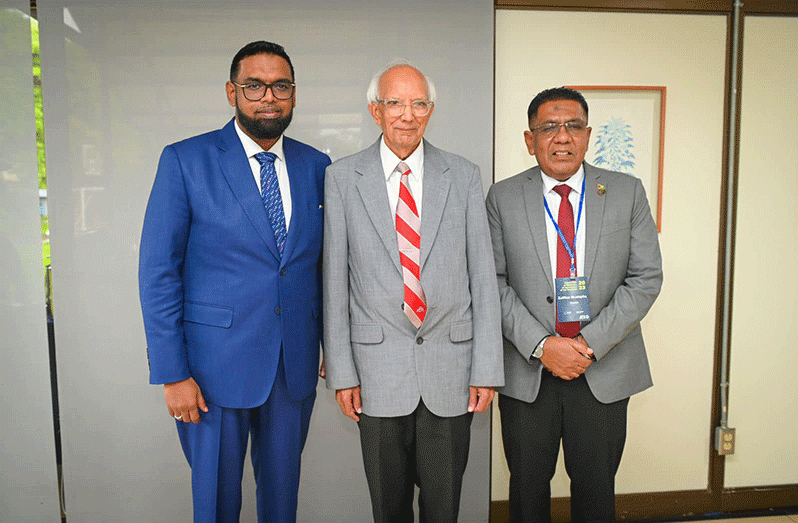THE Inter-American Institute for Cooperation on Agriculture (IICA) has signalled its support for Guyana and the Caribbean Community (CARICOM) in achieving regional food security targets.
According to a press statement from the Office of the President, Guyana’s Head of State, Dr. Irfaan Ali met with several officials in Costa Rica, where he led fruitful discussions on the region’s efforts to reduce its high food import bill by 25 per cent by 2025.
It was revealed that the Guyanese Head of State met with the World Food Prize Laureate, Dr. Rattan Lal, and one of the 2019 Nobel Memorial Prize in Economic Sciences recipients, Dr. Michael Kremer.
The statement disclosed that Dr. Lal, a distinguished soil scientist, indicated his interest in working with Guyana and the Caribbean Community (CARICOM) on extending the living soils programme.
The programme is aimed at conserving quality soil through good land management practices, and by transforming agricultural systems into ecosystems that capture more carbon in the soil.

The meeting was facilitated by IICA on the sidelines of the 22nd Regular Meeting of the Inter-American Board of Agriculture.
The Head of State discussed the use of technology and innovation to support farming operations with Dr. Kremer, who indicated his willingness to work with Guyana, via IICA, to achieve its agricultural objectives.
During a previous discussion with the directors of the Inter-American Institute on Cooperation in Agriculture (IICA), including Director-General Manuel Otero, the Guyanese Head of State said the country has already embarked on a programme to ensure that 35 per cent of the newly-established farms are operated by women and youth.
“We have already launched a programme in Guyana where we said we want 35 per cent of all the new farms to be owned by women and young people, and we are already on target with this,” President Ali had told IICA officials at that meeting.
He added: “All the new agro-phonics shade houses that we are doing young people are involved. The marine cage project, not only young people, but the indigenous communities; teaching them how to apply technology.”
President Ali and Guyana’s Agriculture Minister Zulfikar Mustapha currently hold leadership roles in advancing the region’s food security.
President Ali was in Costa Rica to receive an IICA award for his Leadership Role in Food Security and Sustainable Development in the Caribbean Region, and to meet with experts and leaders in the sector.
Minister Mustapha and other Government representatives were also at the meeting.
Later this month, the country will be hosting the region’s third Agri-Investment Forum and Expo.
Regional leaders and private sector stakeholders will gather to discuss areas of investment and collaboration to further push the food security agenda.
CARICOM members have collectively achieved 57 per cent of its ‘Vision 25 by 2025’ target thus far.
This was after each country would’ve submitted their report detailing their production data for 2022 for targetted commodities, as CARICOM moves towards lowering the regional import bill by 25 per cent by the year 2025.
Products such as cocoa, dairy, meat, root crops, fruits, and poultry have already reached 96.13%, 84.36%, 72.28%, 70.91%, 70.77%, and 70.19%, respectively, for the targetted production volume set for the year 2025.
Countries such as Guyana, Belize, Barbados, Trinidad and Tobago, Dominica, St. Vincent and the Grenadines, Suriname, Dominica, and Jamaica have made significant advances in the production of commodities such as ginger, turmeric, corn, soya bean, root crops, fruits, cocoa, poultry, meat, fish, table eggs, and dairy.
Several priority areas have been identified for 2023, among them agriculture insurance and financing, trade and E-agriculture, resource mobilisation, and trade support. (Naomi Parris)




.jpg)










